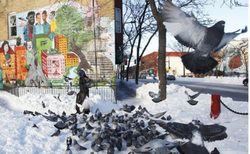 Adhan echoes across Minnesota, US, from the loudspeakers of a mosque for the first time.
Adhan echoes across Minnesota, US, from the loudspeakers of a mosque for the first time. RNA – After Adhan echoed across the United Kingdom and continental Europe, the call to prayer (adhan) echoed across Minneapolis and the neighbouring communities on Thursday ahead of the holy month of Ramadan. The Adhan again broadcasted on Friday. The practice will continue throughout Ramadan five times a day to facilitate the Muslim communities.
Ramadan begins in the midst of the state’s stay-at-home order. Minneapolis Mayor Jacob Frey says the city worked with leaders in the Muslim community to have the “call to prayer” broadcast by speaker five times a day in the Cedar-Riverside neighbourhood. “We want to make sure that people can practice their religion, yes, but it can’t conflict with the overarching public health guidelines,” Frey said. “It allows people to stay together even when they’re praying apart, and we want to make sure that we’re doing proper social distancing and physical distancing in particular.”
Cedar-Riverside has a large Muslim population. Leaders hope the sound to prayers will be a connector for all who feel isolated from community because of COVID-19, according to CBS Minnesota. The simple, short call – known as the Adhan – marked an historical moment for Minneapolis and major cities across the United States, community members said. While the Adhan is commonly broadcast throughout the Middle East, North Africa and other places, for many Muslims in the US, it is only heard inside mosques or community centres.
“There’s definitely a lot of excitement,” said Imam Abdisalam Adam, who is on the board of the Dar al-Hijrah mosque, from where the adhan will be broadcast. “Some people see it as historic,” Adam told Al Jazeera. “To the point … that they’re not doing it, able to see it in their lifetime.” Imam Sharif Mohamed of the neighbourhood’s Dar al-Hijrah Mosque said the broadcasts are a way to remind the faithful that they “are not alone,” even as they’ve spent weeks inside their homes.
“This is a re-connection, a calming, to give people assurance that we are with you,” said Mohamed. “That’s what we try to achieve.” Minneapolis is a little different, because the prayers will be broadcast in the heart of a large metropolitan area, said Jaylani Hussein, director of CAIR-Minnesota. “This is a unique opportunity,” Hussein said. “It’s a reminder to everyone that we are all in this [pandemic] together.”
Hussein acknowledged that the daily broadcasts could fuel anti-Muslim sentiments. But those sentiments already exist, he said. The broadcasts are a public show of support to the Muslim community, in particular to the elderly and the sick who will be comforted by the broadcasts, he said. “Just as we have historically allowed churches to call out for prayers using a bell, this is a continuation of the same freedom that other faiths have had,” Hussein said, Star Tribune reported.
Global Village Space
112/940